- Home
- Ellen Datlow
Inferno Page 16
Inferno Read online
Page 16
“Oh sure. After all, he’s eight years old.”
She didn’t seem to get it. “What do you suggest we do?”
“Ignore them. They’ll pass of their own accord if you stop bringing them up. Jesus, Cale, all kids have bad dreams sometime or other.”
“I never did. Not like his.”
“We all have nightmares. Why should you be different?”
He looked at her and heard himself say, “I just never did.”
“Or you forced yourself to forget.”
Maybe she was right. He turned back to the garden. Jack had laid one Action Man face down in the water. He was draping strings of pond weed over the doll. He paused and glanced up toward the house, before turning his attention once again to his game.
Polly came up behind Caleb and slipped her arms around his waist. “You just need to give him a little time,” she said, pressing her lips against the back of his neck.
How much time, Caleb wondered, feeling an ache of tenderness as he watched Jack rise up onto his knees. The same nightmare four times in one week. How much time before reason was exposed as a hollow lie? He would not let it happen.
As if feeling his isolation, Polly pulled away. He was about to reach for her when he saw what Jack was doing. The boy was kneeling over the pond where the Action Man floated, covered with strands of weed. His hands were clasped together, his head was tilted skywards, and his lips were moving. Caleb’s flesh tingled with disquiet. What kind of game was it that necessitated prayer?
Jack and Gary raced into the dunes ahead of Caleb and Cyril. A stiff breeze blew in from the east, across Oxwich Bay, unleashing small, foam-flecked waves to snap at the shore. Caleb followed the terrier up the steep, sliding bank of a dune. The boys were waiting for him atop the grassy ridge. Jack looked skinny and frail next to his friend, who, though only a month older, was a good six inches taller and a few pounds heavier. Sometimes Caleb feared for his son when he watched the rough and tumble of their play, but he was glad too that Jack had such a friend. Gary seemed to him indomitable, and he hoped that some of that strength would rub off on Jack. No nightmare last night. Third dreamless night in a row. Perhaps Polly had been right after all.
“We’re gonna hide now,” Jack said. “You gotta count a hundred.”
Caleb nodded. He called Cyril to him and held on to the dog while the two boys took off. He began counting out loud as he watched them scramble farther up through the tough marram grass. Cyril whined and struggled to chase after them, but Caleb held him until he had reached fifty. Then, still holding the dog by his collar, he crawled up the slope and peered over the crest of the dune. Jack and Gary were sixty or seventy yards ahead, running through the small dip toward another rise. He waited until they had disappeared around the side of the hill, then called out that he was coming. Letting Cyril race ahead of him, he followed their path, before cutting across and up the dune at a steeper angle. Crouching as he came over the crest of the hill, he scanned the dune slack below, searching the bracken and coarse grasses for anything other than wind-induced movement. He spied a patch of yellow moving beyond the pink and white trumpets of a bindweed-choked tree, and quickly chose a route that would allow him to get ahead of the two boys.
Soon after, he popped up from behind a thick mound of marram grass and made booming noises as he shot them with his forefingers. After yelping in surprise, the boys collapsed spectacularly into the scrub.
By the time they had picked themselves up and started counting, Caleb was already heading deeper into the dunes. He ran for about a hundred yards, found cover in a clump of bracken, and lay on his back to watch the cirrus clouds race across the sky. He could hear the sea rolling in over the long flat stretch of the bay, the screech of gulls and the wind whistling through the dune grass. He closed his eyes for a moment and heard voices carrying on the breeze. He was surprised at how much distance and the wind distorted the sounds, made them indecipherable, barely recognizable as human. The vastness of the sky overhead instilled in him a sense of isolation, which added to the strangeness of the voices. Despite the coolness of the breeze, he felt trickles of sweat on his back as the words shaped themselves in his head. Something about time. He listened more intently, made out Jack’s voice, frightened, asking what happens at thirteen o’clock. A sudden rush of panic swept through Caleb. He sprang up from the bracken and spun round, searching the immediate vicinity for his son. There was no sign of either boy. He was about to call out when he heard Jack shouting from the top of a dune some sixty yards away. The boy waved to him, then followed Gary and the dog down the slope.
“You’re ’sposed to hide, Dad,” Jack said, as they arrived, breathless, beside him. “That was too easy.”
“We would have found you anyway,” Gary said. “Cyril had your scent.”
There was nothing in either boy’s faces to confirm what Caleb had heard. He had imagined it, he told himself. The wind and his own anxiety about Jack. Understandable, if foolish. He thought the boy looked a little pale, but he seemed untroubled. “Okay,” he said. “I think it’s time to go.”
“Not yet,” Jack said. “We only had one go of hiding.”
Gary nodded, and without waiting for Caleb to agree, he tore off up the nearest slope. Caleb felt a surge of anger but he suppressed it. He gestured to Jack. “Get going,” he said. “Make it good.”
Jack sped off after his friend. Cyril stayed with Caleb of his own accord. It was getting on for seven and a chill lingered in the late April air. As he watched them disappear over the top of a high dune, he regretted letting them go again and considered calling them back. But they were gone now, and despite his sense of unease, he didn’t want to spoil their fun. He counted slowly to fifty, then set out on their trail. He climbed the dune and scanned the nearby hollows for any trace of them. “Where they go boy?” he said, more to himself than the dog, who had stopped to investigate a few pellets of rabbit shit. Caleb shrugged, scrambled down the dune toward a trail that skirted the copse separating the dunes from the marshlands beyond. He followed this path to the end of the trees, then climbed up the nearest slope to get a better view. From the top, he saw the gray ocean and a thin line of sand, separated from him by the expanse of green, cascading dunes. A sudden, intense fear bloomed inside him as his eyes searched the windswept slacks. “Jack,” he cried out. “Time to go, son.”
No voice came back to him, just the moan of the insistent breeze through the coarse grass and brittle sea holly. He moved in a shorewards direction, clambering down one dune and up the next, calling Jack’s name. He felt a tight knot in his stomach as he forced himself up the yielding slope. It sapped his strength and robbed him of breath. He reached the top, lightheaded and panting. Cyril scampered up the path behind him, tongue lolling out of his mouth. He stopped abruptly and turned, just as a figure burst out from the scrub.
It was Gary. Caleb’s relief dissipated when he saw the boy was alone. “Dammit, Gary,” he snapped. “Where the hell is Jack?”
Gary’s grin slipped. “I—I’m sorry Caleb. We didn’t mean to—”
Caleb saw that he had frightened the boy unnecessarily. “It’s all right. Just tell me where he’s hiding.”
“I didn’t see,” Gary said.
Caleb’s fear intensified. “Which way did he go?” he said, trying to keep his voice calm.
Gary looked around, then pointed back toward the marsh. Caleb took his hand, and together they headed down the slope. The sweat chilled his body as he raced over damp scabious, calling out. The minutes ticked by and dusk began to roll in from the bay. Odd terrors clawed at the frayed edges of his mind, and his limbs shook with fatigue as he searched through the trees. What had he been thinking, especially after what Jack had been through? Please, please, let him be okay.
A whispered sound caught his attention. He turned and saw the dog running along another path back into the dunes. “There,” he shouted at Gary, a sharp pain piercing his side. He staggered after the boy and dog. Beyond them,
he caught a glimpse of yellow through the scrub, lost it, then saw it again, unmoving on the ground behind a stunted tree. His heart was pumping furiously and the cry of despair was on his lips as he came round the tree and nearly crashed into Gary, who stood over the motionless form.
Jack was grinning up at them. “What took you so long?” he said.
For a second, Caleb teetered on the edge of rage, then he fell to his knees and hugged Jack tightly to his chest.
Caleb turned into the school carpark. Beside him, Jack stared blankly ahead. He’d not spoken in the six-minute drive from the doctor’s surgery to the school. After a dreamless week, the nightmare had returned to ravage the boy. Caleb had heard him cry out sometime after midnight. He’d run to Jack’s room and had found him sitting upright, his gaze fixed on nothingness. Traces of whatever haunted his dreams lingered in his eyes even after Caleb had woken him, but he had been unable to ascribe it a material substance or meaning. And all the doctor had had to say was that there was nothing physically wrong with Jack. Jesus Christ—what did he expect? Broken bones? A gaping wound? Caleb had wanted answers, not fucking platitudes. Tell him why Jack was having these nightmares, what was scaring him. Instead, he’d had to listen to bullshit reassurances about Jack’s overactive imagination and how they should maybe monitor his TV viewing and ease up on the bedtime stories. Polly would be relieved, even if she had more or less predicted what the doctor would say. Maybe he was overreacting.
Caleb turned off the ignition, his body tense with anger and concern. He glanced at his son in the passenger seat. Jack looked too fragile, he thought, too lost inside his own head. He wanted desperately to hug the boy, to let him know that he would do anything for him, but he was afraid that Jack would somehow see the truth.
“You sure you want to go to school?” he said. “I can take you home if you want.”
“I’m okay,” Jack said.
Caleb felt sick with anguish. He didn’t want to quiz his son but felt he had no choice. “Jack, the other day, when you asked Gary about thirteen o’clock, what did you mean?”
“About what?”
Caleb forced a smile. “When we were down at Oxwich. You asked him what happens at thirteen o’clock.”
Jack seemed confused. “I don’t know what you mean, Dad.”
Caleb wondered if his son was being evasive. “Maybe, like Rat and Mole, you feel that it’s better to forget some things?”
Jack shook his head, making his uncertainty evident. “I never heard of it.”
Caleb believed the boy. He leaned over and hugged him, trying to squeeze strength into his son. “I love you, Jack. You know that?”
“Yes.”
“I won’t let anything hurt you.”
“Dad,” Jack said, his voice muffled against Caleb’s chest. “I don’t want you to go.”
Caleb stifled a sob and patted him on the back. “I got work, Jack.”
The boy pulled away from him. “I didn’t mean—” He stopped then, kissed his father, and got out of the car. Caleb waved after him as he ran across the schoolyard, but Jack didn’t look back.
Alone, his eyes watered, and he felt overwhelmed. His love was compromised by a sense of powerlessness, of having failed his son. He felt guilty too, at being afraid, not for Jack but for himself. He was ashamed of his weakness and angry at what he saw as the failure of his reason. He caught sight of something in the rearview mirror, a child’s bewildered face staring at him from the back seat. Jack’s, he thought at first, but after a moment he realized it was his own, as it had been thirty years ago. The cheeks were pale, the lips thin and trembling, the eyes haunted. Caleb felt the glacial creep of fear across his skin. Wanting to connect with the abandoned child, he reached up, touched the mirror, and saw the child’s features blur and reassemble themselves into his own harrowed face.
Discordant sounds frayed Caleb’s nerves and a harsh chorus of jeers echoed from the far end of the bar. He realized Polly wasn’t really listening to what he was saying. Her attention was elsewhere; on the football match playing on the big screen television, or maybe on the people gathered in front of it. As if sensing his scrutiny, she returned her gaze to him and said, “I’m sorry, Cale. It’s just that I thought we could, you know, talk about something else.”
“Something else?”
She sighed. “We don’t often get the chance to go out for a night. We’ve both been under a lot of strain lately, I thought it would do us good to be alone together.”
Caleb frowned, frustrated at what he perceived as a lack of concern. “You don’t think we owe it to Jack to—”
“Please don’t play the guilt thing on me,” she snapped. “Of course I’m concerned, but Jesus Christ, Cale, we just have to be patient.”
“I think we should take him to see a specialist.”
“If they continue, yes, maybe we should take him back to Dr. Morgan and get him to refer Jack to someone. But just for tonight, can’t we talk about something else?”
It was a reasonable request, he knew. Jack’s problem had taken its toll on them both. And yet, he was wary of looking away. “All right,” he said. “Let me just say something, then we’ll talk about whatever you want.”
Polly’s lips tightened and she leaned back in her seat, away from him.
“The common thing is a stranger,” Caleb said. “Think about what that means. For a kid it signifies danger, right? What are kids told all the time? Be wary of strangers, and this is drummed into their unconscious.” He spoke quickly, trying to flesh out his still sketchy interpretation, how Jack’s fear of strangers was manifesting itself in his dreams as someone coming to kidnap him. Stories in the papers and on the TV about kids being abducted and murdered. That young girl found strangled in the woods outside Cardiff a couple of months ago, and more recently, the teenage boy whose naked body was found beaten to death on the sands along Swansea foreshore. Kids weren’t impervious to things like that, he said. They made connections, even if they weren’t conscious of doing so. In bad dreams, the most irrational things became real.
Polly finished her bottle of Corona. She tried to sound reasonable but Caleb could hear the frustration in her voice. “It’s not that what you’re saying isn’t plausible, Cale. Maybe it is, I don’t know. I’ll read up on it. But I think you’re becoming obsessed with this. What chance has Jack got of forgetting the bloody dreams if you keep on about them?”
“Ignoring it isn’t going to make it stop.”
“It sounds to me like you don’t want them to.”
“Shit, Polly, what the hell is that supposed to mean?”
She got up from her seat. “I want to go,” she said. “I can’t talk about this anymore.”
Caleb grabbed her arm and said, “This is Jack we’re talking about.”
She pulled her arm free. “No it isn’t. It’s you.” She hurried from the bar.
He sat there for a few moments, immobilized by panic and fear. How could she not sense the threat to their son? Slowly, his panic subsided and he followed her out onto the street. He saw her crossing the main road to the carpark. A mild rain was falling and the lights of Mumbles flickered on the dark bay like fragile memories. Caleb felt alone as he walked after her, distanced from everything he held dear. How does a man get back what he’s lost, he wondered, puzzled at the question. He wasn’t even sure what he had lost. Some memory, or maybe some part of his self-belief.
Anna, the baby-sitter, was watching The O.C. when they got home. Jack was fine, she said. Not a peep since she’d put him to bed at nine. Polly asked Caleb to check on him while she ran Anna home.
Alone, Caleb headed upstairs. A wave of relief swept through him when he saw Jack was sleeping soundly. The muscles in his legs quivered, and fearing he would collapse, he went and sat on the edge of his son’s bed. Wan light edged into the room through the open door, falling on Jack’s slippers and a couple of PlayStation games at the foot of the bed. A Manchester United poster was on the wall over Jack’s head, a
nd other posters around the room depicted Bart Simpson and scenes from the Harry Potter movies. Caleb felt a surge of tenderness. The sight of The Wind in the Willows on the night table filled him with sadness and a deep sense of regret.
I’m sorry, Jack, he thought, as he stood up to leave. The boy stirred and rolled onto his back. Caleb’s breath caught when he saw Jack’s eyelids were flickering crazily. His lips moved as if he were trying to speak, but no words came out, only the muted sibilance of dreams. “Jack,” Caleb said, but the sound was less than a whisper. He turned, saw the small armchair beneath the dormer window. He pulled it a little closer to the bed and sat in it. Jack continued to make soft, indecipherable noises on the bed, one hand above the sheet, the fist clenching and unclenching.
Caleb wondered what his son was seeing. He tried to will himself inside Jack’s head, to witness the slow unfurling terror. “Stay with it, Jack,” he said to himself. “Be strong.”
Jack began to toss and turn on the bed, his legs kicking sporadically beneath the sheets. His voice grew louder, but Caleb was still unable to recognize the sounds as words. His movements became more agitated, more violent. Caleb leaned forward in the chair, peering intently at his son. He anticipated some kind of revelation, as long as he didn’t weaken and let his attention falter. That was the mistake he had been making, he realized, as Jack started to scream. Waking the boy too soon. Have to let him go further into it, see what he needed to see. Maybe then it would end. Recalling it in the daylight hours, his reason would overcome the nebulous fear. Jack was writhing now, his lips pulled back in a rictus grin as scream after scream tore from his throat. As awful as it was, Caleb felt he had to let it go on, for Jack’s sake, he told himself, his vision blurring through tears.

 Inferno
Inferno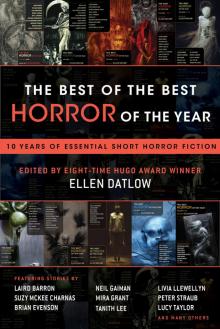 The Best of the Best Horror of the Year
The Best of the Best Horror of the Year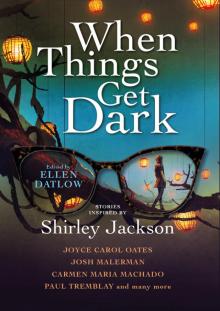 When Things Get Dark
When Things Get Dark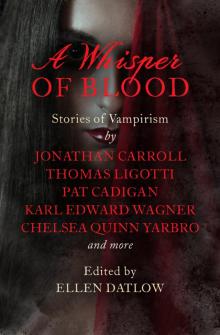 A Whisper of Blood
A Whisper of Blood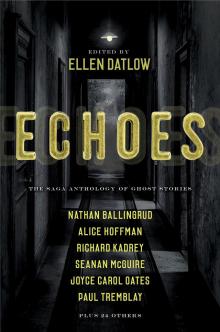 Echoes
Echoes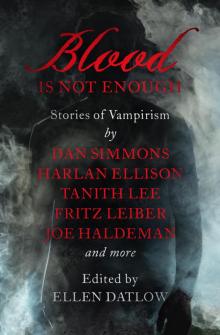 Blood Is Not Enough
Blood Is Not Enough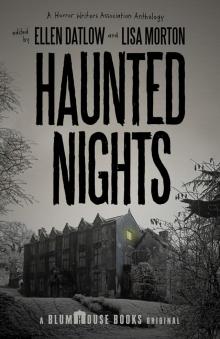 Haunted Nights
Haunted Nights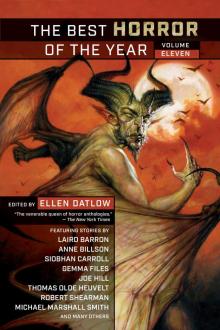 The Best Horror of the Year Volume Eleven
The Best Horror of the Year Volume Eleven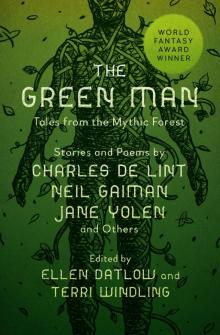 The Green Man
The Green Man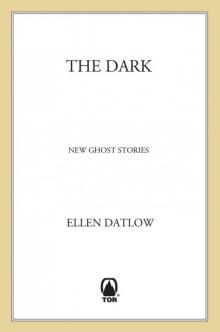 The Dark
The Dark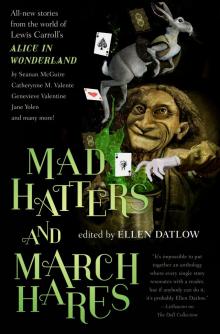 Mad Hatters and March Hares
Mad Hatters and March Hares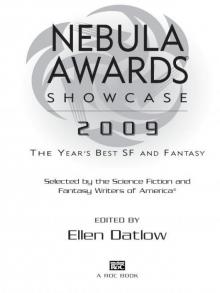 Nebula Awards Showcase 2009
Nebula Awards Showcase 2009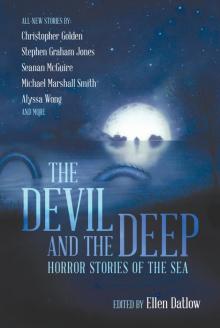 The Devil and the Deep
The Devil and the Deep